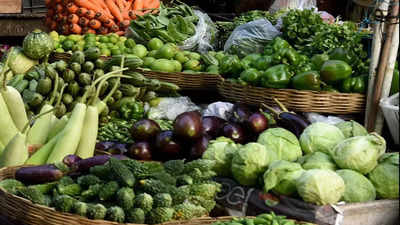
representative image
BENGALURU: Incessant rains pushed up the prices of most vegetables by a minimum of 30% in the past one week, as wet weather shortens the shelf-life of greens. While supply has fallen, demand has remained stagnant, driving up prices in the process.
An employee of Hopcoms (Horticulture Growers Cooperative Marketing and Processing Society) said, “…we have been getting continuous rain for the last two months and hence the rates have gone up. If the rains continue for another week, the prices will go up. And there is a possibility of an increase of 10%.
Almost all vegetables cost around Rs 100 per bundle as their shelf-life is around 24 hours in this season. On the other hand, onion prices have surprisingly remained stable for almost two weeks as fresh supplies have arrived. But the prices of carrots, cauliflower, tomatoes, okra and potatoes have almost doubled in the last seven days.
“While some people have replaced tomatoes with tamarinds, many others are buying half what they used to and coming back for fresh stock later,” the Hopcom employee said. He informed that 60% of Bengaluru’s tomato supply comes from Kolar and the remaining 40% is grown in the immediate neighborhood of the city. “At present, there is no supply from Kolar, meanwhile we are getting only 5% of what is cultivated here.”
Mohamed Idris Chowdhury, general secretary of the Russell Market Traders Association, said vegetables perish in a day or two when exposed to excess moisture. “Vegetable prices have gone up 100% and it is scary for us traders. No doubt farmers are the worst affected as they lose a lot of produce which rots in the field itself. Additionally, some farmers find transportation difficult,” he said.
Most of the farmers have suffered losses as a result of the price rise, some even made some profit. RV Gopi, president of the Vegetable and Fruit Wholesale Traders Association, said: “Farmers with good yields have made substantial profits due to price rise. On the other hand, most of the others have suffered due to the loss of their produce in the rains.”
FacebookTwitterLinkedinE-mail
,